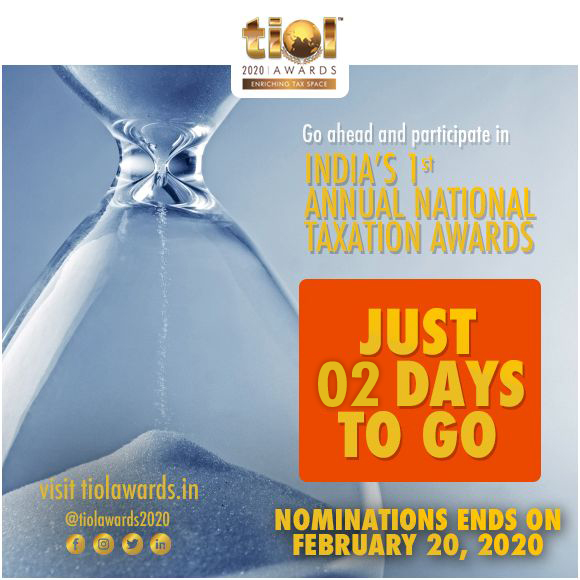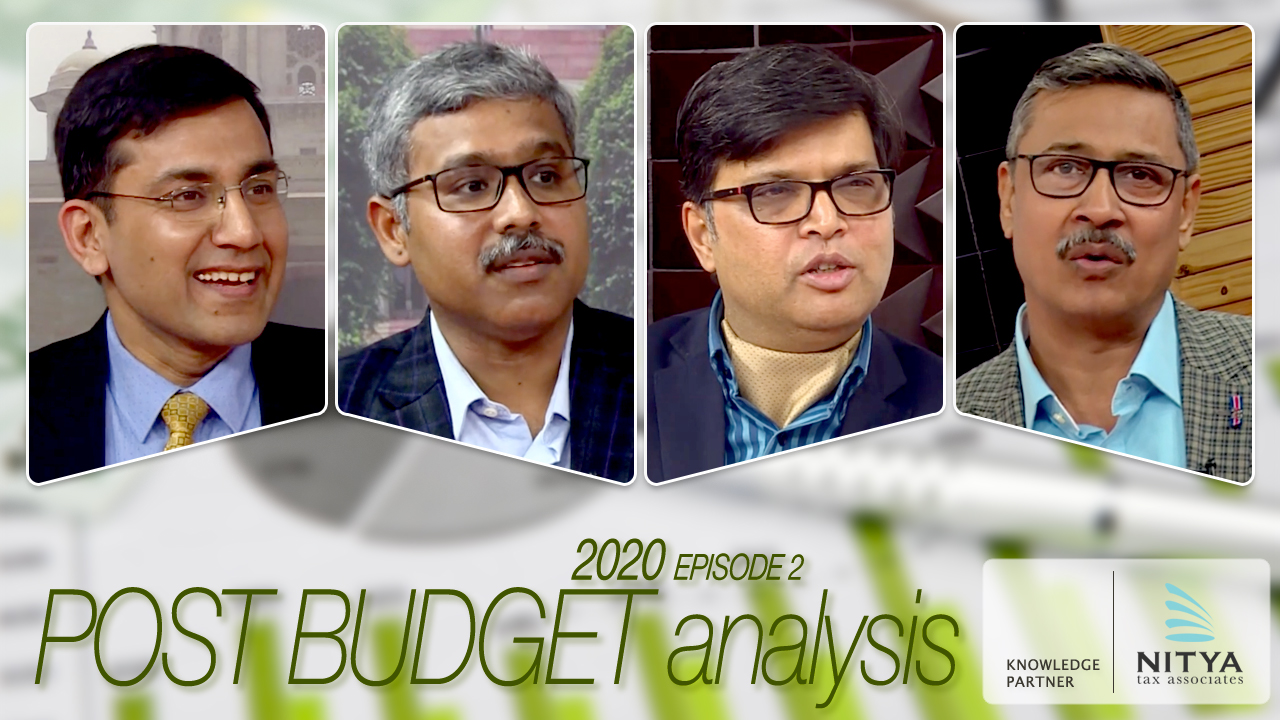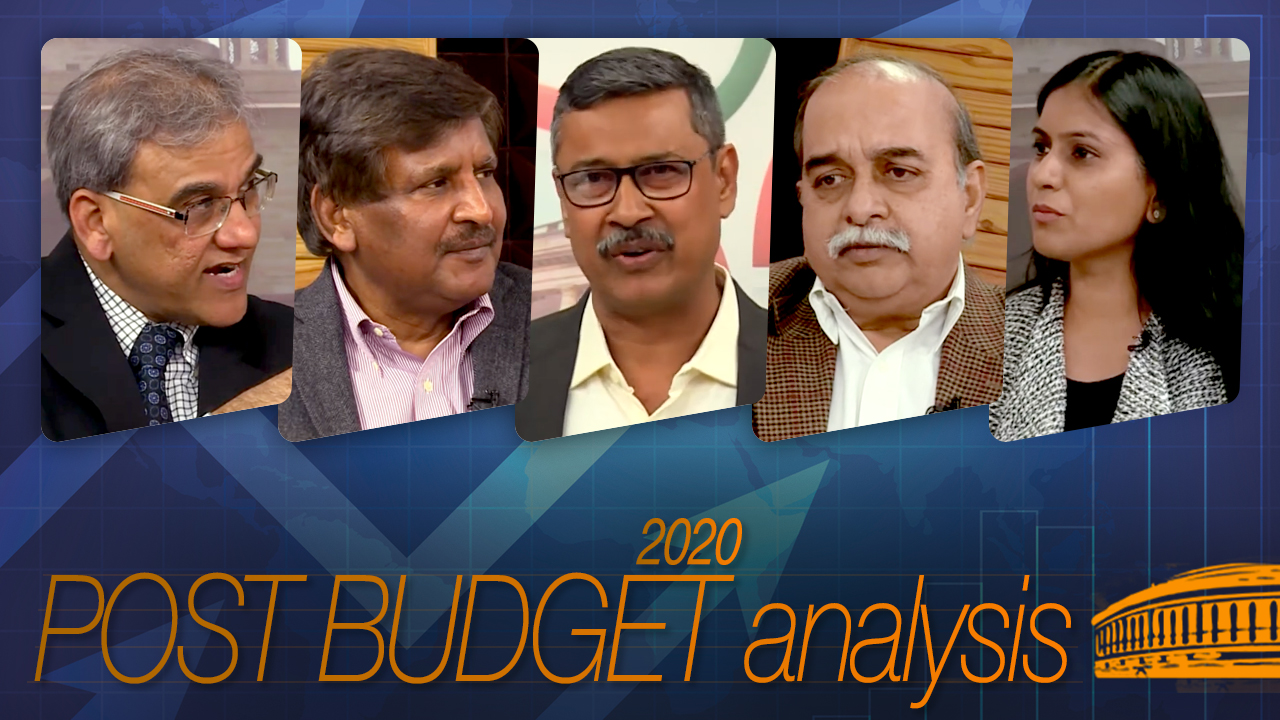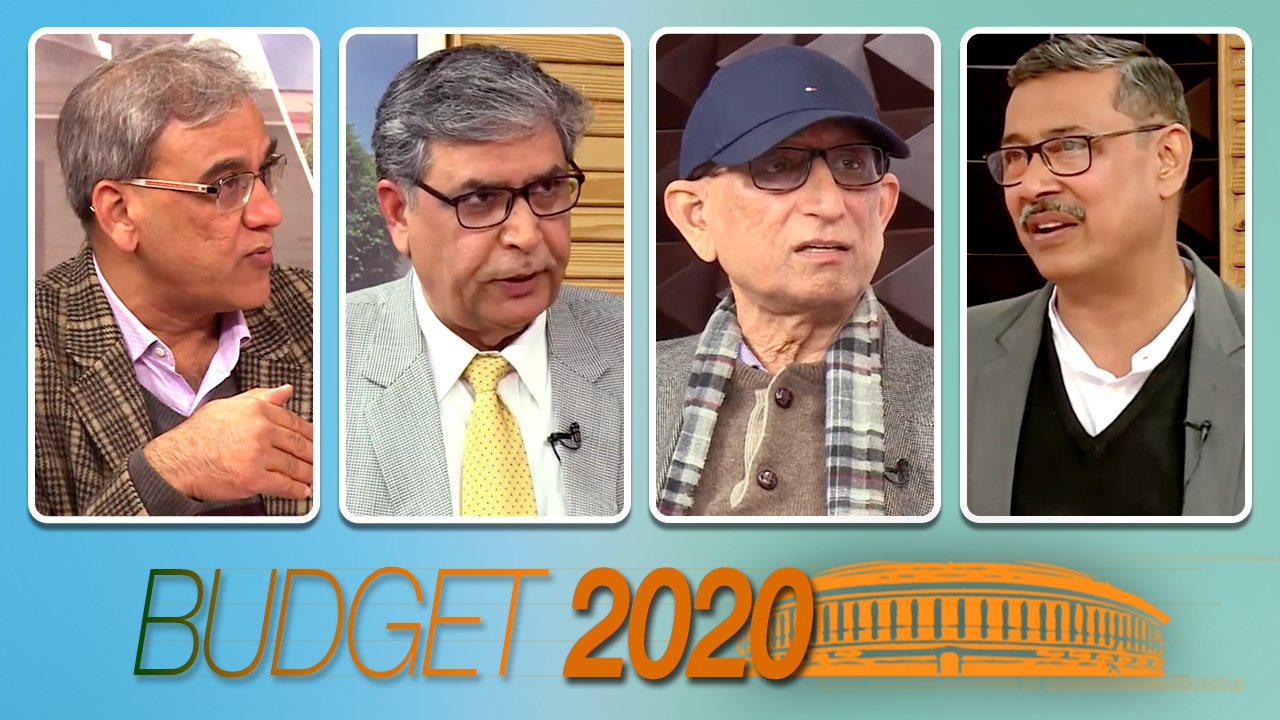 |
 |
2020-TIOL-NEWS-042 Part 2 | Wednesday February 19, 2020 |
 |
 |
Dear Member,
Sending following links. Warm Regards,
TIOL Content Team
TIOL PRIVATE LIMITED.
For assistance please call us at + 91 850 600 0282 or email us at helpdesk@tiol.in. |
 |
|
 |
 |
 |
TIOL TUBE VIDEO |
 |
|
 |
DIRECT TAX |
 |
|
 |
 |
 |
 |
 |
 |
 |
|
2020-TIOL-414-HC-DEL-IT
Experion Developers Pvt Ltd Vs ACIT
Whether at stage of re-opening of assessment, reasons to believe in respect of income escaping assessment, should be in existence - YES: HC
Whether such reasons recorded must be established as being germane and relevant to the subjective opinion formed by the AO regarding escapement of income - YES: HC
Whether nonetheless, it is also not necessary for the AO to finally ascertain escapement of income by recording conclusive findings & it suffices if the AO can show the prima facie grounds based on which reasons are recorded - YES: HC
Whether when transaction is found to be bogus based on subsequent information, mere disclosure of true & complete facts does not bar the Revenue from initiating reassessment u/s 147 - YES: HC
Whether obtaining sanction of the relevant authority u/s 151 of the Act is a necessary pre-requisite for issuing notice for re-assessment - YES: HC
Whether there is any requirement to issue two separate SCNs to an amalgamated company, one being in its capacity as successor of the amalgamating company & the other in the name of the merged entity - NO: HC
- Assessees' writ petitions dismissed: DELHI HIGH COURT
2020-TIOL-396-HC-MAD-IT
CIT Vs Ennore Foundries Ltd
On appeal, the High Court remanded the matter back to the AO for de novo assessment as the appeal was restricted under the monetary limit for filing an appeal with respect to CBDT Circular No . 17/2019
- Case disposed: MADRAS HIGH COURT
2020-TIOL-395-HC-MAD-IT
CIT Vs Express News Papers Ltd
On appeal, the High Court remanded the matter back to the AO for de novo assessment as the appeal was restricted under the monetary limit for filing appeal with respect to CBDT Circular No. 17/2019
- Case disposed: MADRAS HIGH COURT
2020-TIOL-264-ITAT-BANG
General Motors Technical Centre India Pvt Ltd Vs DCIT
Whether it is settled position in law that total turnover is the sum of the domestic turnover & export turnover - YES: ITAT
Whether therefore, it is apposite that if an amount is reduced from the export turnover, the total turnover will also be reduced automatically by the same amount - YES: ITAT
- Assessee's appeal dismissed: BANGALORE ITAT
2020-TIOL-263-ITAT-HYD
Quality Care India Ltd Vs DCIT
Whether it is fit case for remand, in respect of additions framed u/s 2(22)(e), where the assessee claims to have acquired the business of the entity to whom it had made payment - YES: ITAT
- Case remanded: HYDERABAD ITAT
| |
|
 |
   |
 |
|
 |
 |
GST CASES |
 |
|
 |
 |
 |
 |
 |
 |
 |
|
2020-TIOL-413-HC-AHM-GST Nathalal Maganlal Chauhan Vs State of Gujarat
GST - On 30th December 2019, the son of the writ-applicant came to be arrested by the respondent no.4 in exercise of powers under Section 69 of the CGST, 2017 - The arrest was on the reasonable belief that the son of the writ-applicant has committed offence under Section 132 of the Act 2017 - son of the writ-applicant came to be produced before the Chief Metropolitan Magistrate at Ahmedabad who, in turn, remanded the son of the writ-applicant to the judicial custody - Writ applicant is questioning the legality and validity of the Notification No.EST/1/Jurisdiction/B.2168 dated 5th July 2017, by which the Commissioner of State Tax has delegated all his powers to the Special Commissioner of State Tax and the Additional Commissioners of State Tax.
Held: Delegation generally means parting of powers by the person who grants the delegation, but it also means conferring of an authority to do things which otherwise that person would have to do himself - As a general rule, whatever a person has the power to do himself, he may do by means of an agent - This broad rule is limited by the operation of the principle that a delegated authority cannot be re-delegated, delegatus non-potest delegare - The naming of a delegate to do an act involving a discretion indicates that the delegate was selected because of his peculiar skill and the confidence reposed in him and there is a presumption that he is required to do the act himself and cannot re-delegate his authority - As a general rule, "if the statute directs that certain acts shall be done in a specified manner or by certain persons, their performance in any other manner than that specified or by any other person than one of those named is impliedly prohibited" - Normally, a discretion entrusted by the Parliament to an administrative organ must be exercised by that organ itself - At the same time, it is settled position of law that the maxim "delegatus non-potest delegare" must not be pushed too far - The maxim does not embody a rule of law but it indicates a rule of construction of a statute or other instrument conferring an authority - Prima facie, a discretion conferred by a statute on any authority is intended to be exercised by that authority and by no other, however, the intention may be negatived by any contrary indications in the language, scope or object of the statute - The construction that would best achieve the purpose and object of the statute should be adopted - it is essential that the delegated power should be exercised by the authority upon whom it is conferred and by no one else - At the same time, in the present administrative setup, the extreme judicial aversion to delegation should not be carried to an extreme - There is only one Commissioner of State Tax in the State of Gujarat, and having regard to the enormous functions and duties to be discharged under the new tax regime, he has been empowered to delegate his powers to the Special Commissioner of State Tax and the Additional Commissioners of State Tax - Bench takes notice of the fact that the delegation has been authorized expressly under Section 5(3) of the Act - Bench would have definitely interfered if the Special Commissioner or the Additional Commissioners would have further delegated the power to officers subordinate to them but that is not the case here, therefore, the challenge to the legality and validity of the impugned notification should fail: High Court [para 8, 9, 10, 30, 31, 39, 40, 41]
GST - Observations made by the Court in paragraph 35 in the case of Valerius Industries [ 2019-TIOL-2094-HC-AHM-GST ] that Commissioner could not have delegated the powers conferred by the legislature to the three subordinate officers by virtue of the order dated 15th January 2018 could be termed as per incurium as such observations run contrary to the Supreme Court decisions - dictum as laid in the aforesaid Full Bench decision of the Allahabad High Court [ Raghunath v. Indore Municipal Corporation, Indore, AIR 1987 (MP) 181 ] is that, normally the administrative functions and powers can be delegated in favour of a coordinate authority or to a subordinate authority - When administrative function is statutory in nature and the function or the power is assigned under the statute, it should be performed or exercised by that authority unless the power to delegate such function or exercise of power is specifically provided or may be inferred by necessary implication from the provisions contained in the statute - dictum as laid in the aforesaid decision is that, be it quasi-judicial or administrative power, the same can be delegated provided the law expressly or by clear implication permits it to be delegated - writ-applications fail and are hereby rejected: High Court [para 43 to 45, 52, 57, 60]
- Petitions rejected: GUJARAT HIGH COURT
2020-TIOL-12-AAAR-GST
Pattabi Enterprises
GST - AAR had held that supply of access cards and similar material printed by the applicant with the contents supplied by the recipient of supply are classifiable under SAC 9989 (and not under HSN 4901 1020) as supply of service and liable to tax under 9% CGST and 9% KGST and 18% IGST - appeal before the Appellate authority.
Held: Appellant is supplying "Access Cards" to their customer M/s Trilok Security Systems India P Ltd. who provide Mass Queue Management System services at various pilgrim destinations - Access cards are given to the pilgrims free of cost and they contain the pilgrims's digital photo and thumb impression along with information regarding distance to temple, precaution to be taken by pilgrims who are old, sick, physically weak and also first aid centre details etc. - activity undertaken by the appellant is one which brings into existence a distinct item i.e. " Access Card" which is used by the recipient for distribution amongst pilgrims - printing is an activity which is ancillary to the emergence of the access card- resultant product is, therefore, a product of the printing industry - Authority is, therefore, of the opinion that the contents of paragraph 5 of the CBIC Circular 11/11/2017-GST dated 20.10.2017 would apply and hence the printing and supply of Access cards by the appellant is a supply of goods - Ruling given by the AAR is, therefore, set aside - insofar as classification is concerned, the access cards being printed cards in single sheets are classifiable under sub-heading 4901 1020 under the category of ‘pamphlets, booklets, brochures, leaflets and similar printed matter'; are covered under entry Sl. no. 201 of Schedule I of 1/2017-CTR and attracts CGST of 2.5%: AAAR
- Appeal allowed: AAAR |
|
|
 |
   |
 |
|
 |
 |
INDIRECT TAX |
 |
|
 |
 |
 |
 |
 |
 |
 |
|
SERVICE TAX
2020-TIOL-318-CESTAT-DEL
Hopp Worldwide Pvt Ltd Vs CGST
ST - As per the provisions of section 127(6) of the Finance (No.2) Act, 2019, on filing a declaration under the SVLDRS, 2019 and receipt of statement from the designated committee indicating the amount payable and upon payment of the amount payable within a period of thirty days, the appeal filed before CESTAT is deemed to have been withdrawn - in view thereof, the impugned appeal is dismissed as withdrawn with liberty to the appellant to approach the Tribunal to restore appeal in case the discharge certificate is not issued for the dispute pertaining to the impugned appeal: CESTAT
- Appeal dismissed: DELHI CESTAT
CENTRAL EXCISE
2020-TIOL-317-CESTAT-MUM
LG Electronics India Pvt Ltd Vs CCE
CX - On plain reading of the Rule 11(3), it is clear that the manufacturer of a final product shall be required to pay an amount equivalent to the CENVAT Credit taken by him in respect of the inputs received for use in the manufacture of final product and lying in stock or is contained in the final product if he opts for exemption on the final product, whereas on the other hand, Rule 3(5) of CENVAT Credit Rules, 2004 allows the manufacturer to clear the inputs 'as such' from the factory or premises of the provider of the output service, on payment of an amount equivalent to the credit availed in respect of such inputs and the removal shall be made in accordance with Rule 9 of CCR, 2004 i.e. against proper invoice - Both the said rules operate in different spheres and do not overlap - In the present case, the Appellants received the inputs when the final product was dutiable and, on its exemption, chose to clear the inputs lying in stock 'as such' following the procedure laid down in Rule 3(5) of CENVAT Credit Rules, 2004 without its use in the manufacture of exempted final product - If the argument of the Revenue is accepted that the credit attributable to the inputs lying in stock would lapse, then the Appellants would be required to clear the inputs as such either without payment of duty or reversal of credit again on the same quantity of inputs on its clearance ‘as such' which would lead to an absurd situation and it cannot be intended by the legislature - Therefore, clearance of the inputs lying in stock as on 01.03.2007, after reversal of the credit following the procedure laid down under Rule 3(5) of CENVAT Credit Rules, 2004 is in harmony with Rule 11(3) of CENVAT Credit Rules, 2004 and not in conflict - Hence, reversal of credit on the inputs cleared as such, is in accordance with the law: CESTAT [para 8]
CX - Appellant had continued to receive the 'inputs' during the month of March 2007 on which they availed credit and cleared the same, instead of being used in their factory to their 100% EOU unit, following the procedure laid down under Rule 3(5) of CENVAT Credit Rules, 2004 - Bench does not find merit in the observations of the Commissioner in confirming the demand under Rule 6(1) of CCR, 2004 inasmuch as the Appellants had not utilised the inputs in the manufacture of exempted finished goods, but cleared as such to their 100% EOU unit - Even otherwise, such clearances are covered under the exception clause laid down under Rule 6(6)(ii) of CCR, 2004 - Since the DTA unit has correctly reversed the credit on the inputs cleared as such to their 100% EOU unit, who in turn, availed the credit and utilised the same in the manufacture of exported goods, cash refund of accumulated CENVAT Credit of Rs.78,97,716/- under Rule 5 of CCR, 2004 cannot be held to be inadmissible to the EOU unit - impugned orders set aside and appeals allowed with consequential relief: CESTAT [para 9, 10]
- Appeals allowed: MUMBAI CESTAT
CUSTOMS
2020-TIOL-316-CESTAT-MUM
Naresh Dudhela Vs CC
Cus - Import of 200 MT of 'Melamine Crystal' - Allegation is fraudulent import of various chemicals in the name of various IECs lent by them to others for a consideration - allegation is also that the value of the consignment was mis-declared in addition to the misuse of IEC - Original authority confirmed the revaluation of the consignment and recalcuated the duty payable while allowing the goods to be redeemed on payment of fine - penalties imposed - aopeal to CESTAT against order of Commissioner(A).
Held: Proprietor has, in his statement dated 23.12.2008 and 21.10.2008, accepted that he had applied for IEC in the name of M/s. Ravi Enterprises with an intention to lend the same for a monetary consideration - such statement has not been retracted - Rajesh P. Joshi, Proprietor's involvement is limited to the extent of lending IEC to other importers for a consideration - penalty levied cannot be comparable to the penalty imposed on the actual perpetrators of the offence, hence penalty reduced - No specific allegations of role other than arranging for the IEC of M/s. Ravi Enterprises to be used, has been brought on record in respect of Naresh M. Dudhela, therefore, Bench finds ample reason for reconsideration of quantum of penalty - Penalties reduced: CESTAT [para 4, 5, 7]
- Appeal partly allowed: MUMBAI CESTAT
| |
|
 |
   |
 |
|
 |
 |
HIGHLIGHST (SISTER PORTAL) |
 |
|
|
 |
|
|
 |
 |
|
 |
 |
TIOL PRIVATE LIMITED.
TIOL HOUSE, 490, Udyog Vihar, Phase - V,
Gurgaon, Haryana - 122001, INDIA
Board :
+91 124-6427300
Fax: + 91 124-6427310
Web: https://taxindiaonline.com
Email: updates@tiol.in
__________________________________
CONFIDENTIALITY/PROPRIETARY NOTE.
The Document accompanying this electronic transmission contains information from TIOL PRIVATE LIMITED., which is confidential, proprietary or copyrighted and is intended solely for the use of the individual or entity named on this transmission. If you are not the intended recipient, you are notified that disclosing, copying, distributing or taking any action in reliance on the contents of this information is strictly prohibited. This prohibition includes, without limitation, displaying this transmission or any portion thereof, on any public bulletin board. If you are not the intended recipient of this document, please return this document to TIOL PRIVATE LIMITED. immediately |
 |
|
 |







